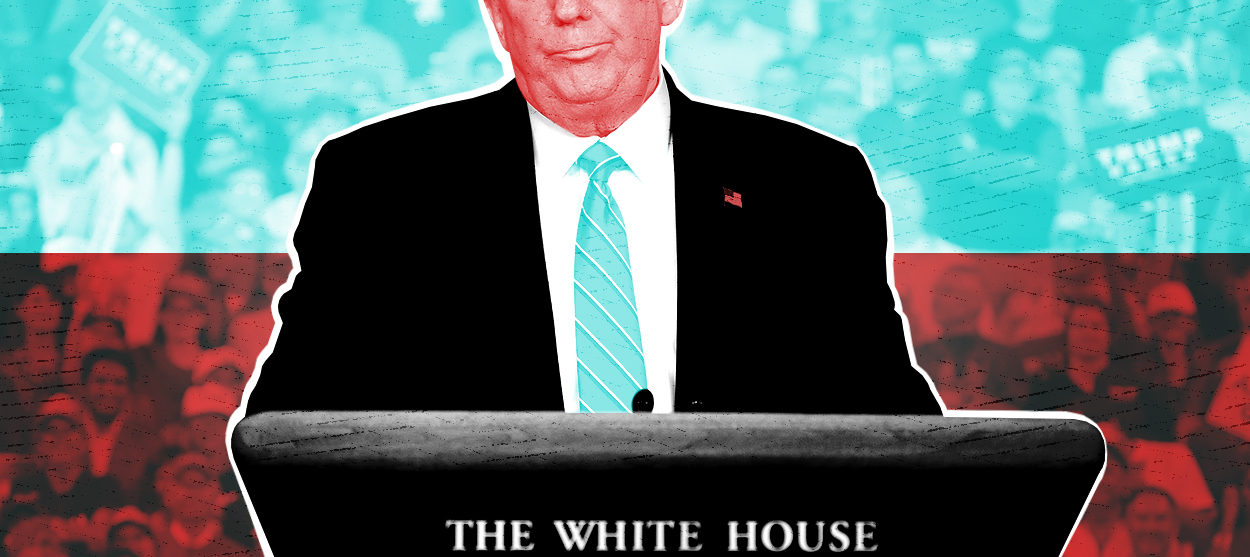What Trump's coronavirus briefings are really about
No, not public health


A free daily email with the biggest news stories of the day – and the best features from TheWeek.com
You are now subscribed
Your newsletter sign-up was successful
If you've watched President Trump's daily press briefings about the coronavirus outbreak, you've learned how little you've learned. Every time he talks about the pandemic, he tells us more about his narcissism than he does about the pandemic.
Trump began holding press briefings when he could no longer hold rallies, and for the same reason: He needs praise like he needs oxygen, and these briefings, like his campaign rallies, are his oxygen tank. Public health is not the point. They are about what Trump wants to hear, not what we need to know.
When he talks about the pandemic, he's vague, misleading, and self-congratulatory, often at the same time. "We have a lot of things happening, a lot of very positive things," Trump said while discussing things.
The Week
Escape your echo chamber. Get the facts behind the news, plus analysis from multiple perspectives.

Sign up for The Week's Free Newsletters
From our morning news briefing to a weekly Good News Newsletter, get the best of The Week delivered directly to your inbox.
From our morning news briefing to a weekly Good News Newsletter, get the best of The Week delivered directly to your inbox.
He prefers to discuss things that have nothing to do with the pandemic, such as his "very popular" wife and "Sleepy Joe Biden." While he has not called for the coronavirus to be locked up, he said, "We're building a wall." His logorrhea occasionally takes him into the unchartered territories of pseudo-empathy and complete sentences, as when he said, "Life is fragile" and "The whole concept of death is terrible."
Also terrible is the credit Trump isn't getting. More than anything, he wants to be commended. On Sunday, he complained that "nobody said thank you" after he donated part of his presidential salary to fighting the coronavirus. He donated $100,000, which is $30,000 less than what he spent on silencing a porn star.
Trump boasts of the job he's supposed to be doing ("a phenomenal job") and cites people without proper names as confirmation. "Many doctors — and I've read many, many doctors — they can't believe the great job that we've done," he claimed. He said governors are "loving what we're doing," "were thanking us for the job we did," and "were very complimentary." Asked if he sold any stocks before the epidemic, Trump compared himself to George Washington, "a rich man" who "ran the presidency and he also ran his business."
Even when Trump is not talking about himself, he talks about himself. A reporter asked if he regretted his handling of the crisis. "I'm not interested in myself," said Trump, putative author of eight books whose titles begin with "Trump," about himself.
A free daily email with the biggest news stories of the day – and the best features from TheWeek.com
When not praising himself, Trump vilifies those who fail to praise him as much as he does. He denounced "fake news" and "dishonest journalists." He reprimanded NBC News correspondent Peter Alexander for asking "a very nasty question" and told him, "You're a terrible reporter." He called The Washington Post and Wall Street Journal "very dishonest media sources." Last week, he said he wanted to "get rid of about another 75-80 percent of you. I'll just have two or three that I like in this room." The president is holding press conferences in a pandemic to say he wants to get rid of the press.
It's no wonder why he feels this way. Unlike at his rallies, where thousands of fans shout his name, the audience at his coronavirus briefings consists of reporters asking questions about the health and safety of Americans, all but one of whom are not him.
Instead of reassuring the country, Trump wants the country to reassure him.
Last week, his friend Lou Dobbs gave him a farrago of praise, adulation, and exaltation. On Twitter, Dobbs asked people to "grade President Trump's leadership in the nation's fight against the Wuhan Virus." The three options were "superb," "great," and "very good." Two days later, Dobbs self-quarantined after one of his staffers contracted the coronavirus, which suggests that Trump's leadership has been very good, not superb or great.
Republicans have criticized Democrats for politicizing the pandemic. Yet, at his press briefings, Trump's sycophants, not health experts, do most of the talking, and most of their talking consists of praise for the president. They thank him for the opportunity to praise him. At Sunday's press briefing, the president's trade adviser Peter Navarro began his remarks by saying, "Thank you, sir. Thank you, Mr. President." He concluded by saying, "I salute you, sir."
Meanwhile, Dr. Anthony Fauci, the director of the National Institute of Allergy and Infectious Diseases and a member of the White House coronavirus task force, was not present at Sunday's or Monday's briefing. Fauci is an expert in infectious diseases, not assuaging Trump's ego. The more you know about something, the less Trump trusts you.
These are not press briefings. They are praise briefings.
Want more essential commentary and analysis like this delivered straight to your inbox? Sign up for The Week's "Today's best articles" newsletter here.
Windsor Mann is the editor of The Quotable Hitchens: From Alcohol to Zionism.
